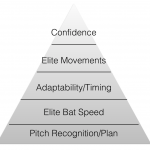The Danger of Specialization
The landscape of youth and high school sports has been changing over the past decade, and not for the better. Many parents and players feel as though they are falling behind other players if they don't get on the best travel team, quit all other sports, have them exposed to the most training in the offseason, and play the most games possible during the summer. For a few players, this schedule will work fine, and they will actually benefit from this type of schedule. The majority of young players will not benefit from this schedule for one or more of the following reasons:
Burnout
Just like adults, when kids do the same thing over and over again, they begin to grow tired of it. The more games, the more leagues, and the more months they play, the more likely they become to resent the game and will likely end up not playing when they get older. Burnout numbers are on the rise, and the increased time demands places on athletes at a younger and younger age are a big part of the problem.
Lack of development
The ideal practice to game ratio for young players is 3:1 for youth players and 1:1 for high school players. Most summer baseball schedules come no where near this ratio, and it hurts player development. Many of of the practices a young player gets are hitting or pitching lessons. While these can be beneficial, they teach only skills, rarely do they work on tactics or actually playing the game (www.cornerstonecoachingacademy.com/play-the-game).
Injury
Research indicates that if athletes repeat the same motions over and over all year, they increase the likelihood of over-use injuries. This is especially true for pitchers since most injuries to pitchers are caused by over-use. Staying active by playing multiple sports throughout the year, and giving their main sport a significant break (minimum 2-3 months) throughout the course of the year.
Sign-Up for our Blog and Bronze Library Here!!!
Here is a link to a New York Times article about Dr. Jobe (performed the first Tommy John surgery). At the end he says "Justin Verlander does not pitch year round. Why do teenagers?"
http://www.nytimes.com/2013/07/28/sports/baseball/doctor-honored-for-tommy-john-surgery.html?_r=1&
They will never reach their potential
Yes, that’s correct. If you stop playing all other sports to play only baseball, you risk not reaching your baseball potential. Other sports teach players to be athletic, how to use your body, how to move in different ways, and increase overall athleticism.
They may not be as mentally strong
Allowing athletes to play different sports in different seasons keeps them competing all year round, and helps them learn how to perform under pressure. There is no pressure on you when in a batting cage with a hitting instructor. There is no pressure when throwing a bullpen to a target in January. Athletes face real pressure when they are on the free throw line with the game hanging in the balance.
The numbers just aren’t in their favor
Parents and players feel that specialization is the best way to ensure a college scholarship, but getting an athletic scholarship to play baseball is not an easy thing to do. With only 11.7 scholarships (maximum) available at each Division I school, the reality is that very few players will pay their way through college playing baseball. Most college baseball players are on a partial scholarship or walk on. Many player’s odds are much better getting academic or private scholarship to help pay for college.
None of the above information is intended to discourage players from working hard or trying to realize their baseball dreams. Taking individual lessons and training for baseball in the offseason will benefit most players, but by playing multiple sports, they decrease their risk of burnout and injury, and become a more well rounded athlete.
There does come a time in a young player’s life when they should be allowed to make the decision to focus more on one sport, or fully dedicate themselves to a sport, but they should never be forced or pushed to focus on only one sports. It is a decision that must be made on their own once they are mature enough to consider all possible consequences. Each player matures at different times and will have the capability to make these decisions at different times in life.
The reality is, there is very little chance that even the best youth player will play professionally, so let them fun! "Play Ball!"
 Posted by Kyle Nelson
Posted by Kyle Nelson- Posted in Uncategorized
 Aug, 12, 2013
Aug, 12, 2013 10 Comments.
10 Comments.
Elite members login here
Check out what’s New/Hot!
Recognizing, Diagnosing, and Fixing Common Hitting Flaws eCourse The 3 metrics we tested on Blast motion sensors this year Sneak Peek Inside an Elite Q and A The batting practice continuum Elite Member’s area table of contents 50+ “Chaos” hitting drills
5 sample Chaos hitting drills FREE
Mental Skills and Culture Building The hitting pyramid Welcome Elite Member, Trey! Ideas for a pitcher first practice 12 week bat speed improvement plan Make plans this offseason to have your team playing their best baseball at the end of the year” Top 5 hitting drills to translate practice skill to game performanceHow we used Blast Motion sensors with a team in 2019
What to do if your hitters are overmatched Welcome Elite Member, Tommy! Setting your baserunners up for success Welcome Elite Member, Mike! A consulting call with Elite Member Matt FREE Web Clinic: Developing Athletic, Consistent, Extraordinary Infielders
 Coach Kyle Nelson
Coach Kyle Nelson





Nice post Kyle. I need to hear this. My youngest son is 8 and far more advance in baseball at 8 years old than his two older brothers were at eight. The past two seasons we have only played baseball and while I know I need to expose him to other sports I have done a poor job of implementing it. This fall he showed some interest in football but after a few days of conditioning camp with the football coaches before sign-ups he decided the football culture wasn’t for him. My plan is to get him signed up for basketball this winter. I appreciate the content and the reminder about the dangers of specialization.
@Marshall- Thank you for the comment and glad I could help. When I was eight, I lived, breathed, ate, and slept baseball. It was the only thing I wanted to do all day every day, but my parents kept me involved in other sports (soccer, basketball, and golf) and I was a better baseball player for it. I still took hitting and pitching lessons in the winter while playing basketball and indoor soccer. I did end up making the decision to concentrate mostly on baseball (I still played golf in high school), but not until I was 16 years old.
That is a shame about the football experience. 8 year old football should be about fun, and the football culture at that age should be about teaching the kids all the different skills. Their conditioning should come through playing tactical games where all kids get a chance to kick, pass, catch, and run with the ball. I’m shocked when I see Pee Wee football practices (or any youth practice for that matter) with young kids running wind sprints, doing hitting drills, and getting screamed at. Some high school football programs have a tough time getting some of their best athletes to come out and I believe it’s because they’ve been getting beat up and yelled at every fall since they’ve been 8 years old.
Thanks for reading and I’m sure he will find a few other sports he enjoys doing during the baseball offseason.
This is why me and my friend Dan are trying to encourage Equal Play Time for all youth sporting events. Please visit us at http://www.equalplaytime.com for more information.With your help we try to keep these kids active and in sports.Thx
Having coached over 3 decades, mostly in jr. college, I’ve been most discouraged by the changes in our pre-college athletic environment. (By the way, there’s nothing wrong with kids these days. The problem is the parents.)
Efforts like the Equal Play Time movement are so very important to young athletes’ development.
Parents are easily lured bu the “elite” program — most of which demand the kid focus on their sport. It’s an exercise in foolishness, with significant dangers to a kid’s development.
We need to remember the value of youth and scholastic athletics:
(1) It teaches the participant to become part of something larger than himself — and to put that something above herself.
(2) It socializes the participant; teaching him/her to navigate the give-and-take of competition, building alliances, proving oneself useful to others, arriving at consensus through compromise.
(3) It teaches the participant to learn and achieve; to figure out the mechanics and tactics of a different sporting experience — which expands cognitive capacity.
By exploring two or 3 sports during a calendar year, the athlete benefits far more from the above values. He/she also has a much greater chance of seeing and valuing oneself as a WHOLE person, not just as a guard or a pitcher(or an athlete).
When should an athlete specialize? In college.
Hooray for Equal Play Time!
Thanks for the comment! I could not agree more. Why do we coach and why do kids play? Are we developing professional athletes? NO! Even the most “elite” team will have a very short list of players who have ever played for money and an even shorter list of those who have played at the highest level. We are developing citizens who will be positive, contributing members of society. Athletics can be a huge part of that development if it is allowed to be.
Nice post Kyle, but maybe there is a reason some kids specialize, check out:
http://benchcoachdad.com/2012/02/17/youth-sports-specializing-fastpitch-softball-has-balance/
Thanks!
Thank you for sharing your article. The kids in that organization are indeed very lucky to get such balance and good instruction. The unfortunate reality is that many people choose to “focus” on one sport due to the promises made about their development and the promises are never fulfilled. As I state, it is a decision every individual player has to make once they are mature enough to make it. It should not be up to their parents, or coaches, it should be up to the player.
I was one who decided to concentrate on baseball after my freshman year in high school. I still played golf as a way of having some fun in the fall, but I also knew how to improve myself in the winter and had good coaches working with me who were concerned about my improvement. My major concern is the player (more so parents) who gets hoodwinked into believing that their son has a shot at an athletic scholarship when he really doesn’t, gets sold a bill of goods, and misses out on activities they could have been participating in.
The article is correct, for some, specialization is the correct choice. My concern is those who make that choice based on false pretenses.
Thanks for reading and for the discussion!
Kyle Nelson
Kyle you are right on the nail here. Specialization is very personal. It will often backfire because most players will never play baseball past high school and they lose opportunities to play multiple sports for the sake of polishing baseball skills. Diversify, and you should not put all your eggs in one basket.
The growth of “travel” sports has created a fear in parents that if their child doesn’t commit to one sport they will fall behind.
There are travel baseball players as young as 9 that are scouted by teams as if they are elite college athletes.
Success stories like Bryce Harper, whose father has said was offered playing time on 2-3 teams per week even from teams in other states as a youth, make me fear this issue will get worse before it gets better.
Some travel coaches do it correct and understand that athletes can play other sports while still dedicating themselves to getting better at baseball. Unfortunately, they are not the ones who’s sales pitch is the most appealing to overzealous parents.